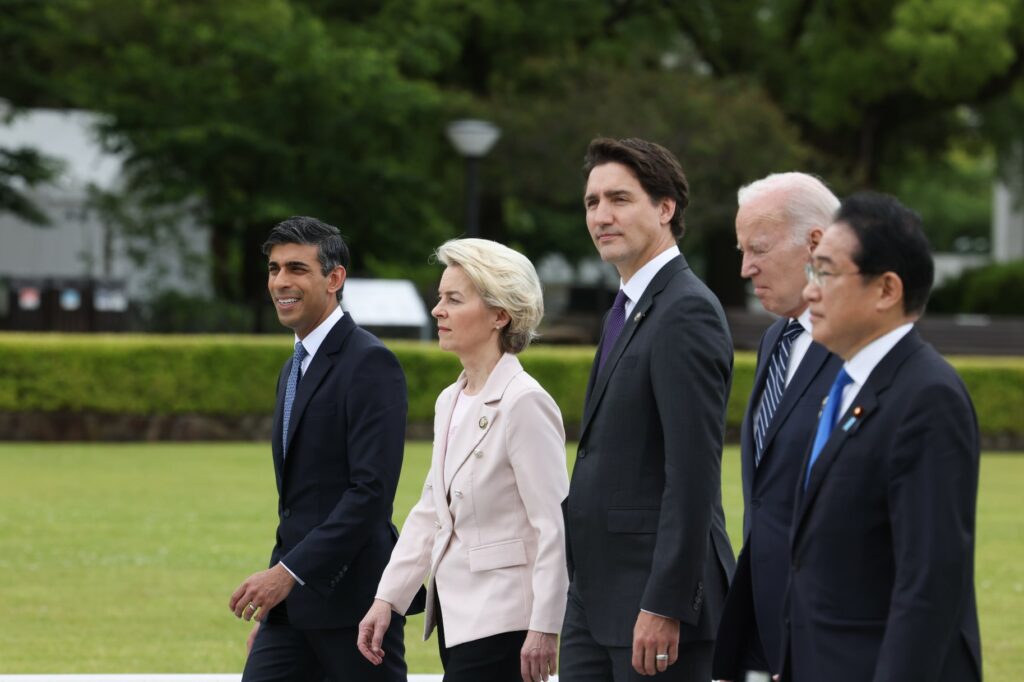G7 leaders reaffirmed their commitment to supporting Ukraine in Russia's ongoing invasion on Friday, reiterating their insistence that Russia pay for the damage it has inflicted upon Ukrainian infrastructure and that the country's leaders be tried for war crimes committed during the conflict.
"We condemn, in the strongest terms, Russia's manifest violation of the Charter of the United Nations and the impact of Russia's war on the rest of the world," read the leaders' joint statement. "Our support for Ukraine will not waver. We will not tire in our commitment to mitigate the impact of Russia's illegal actions on the rest of the world."
The leaders, who are meeting in the Japanese city of Hiroshima until Sunday, also reiterated their support for Ukrainian President Volodymyr Zelenskyy's 10-point peace plan for ending the war. Among other things, the proposal calls for the establishment of a special tribunal to prosecute Russian war crimes.
'No impunity'
"There must be no impunity for war crimes and other atrocities, such as Russia's attacks against civilians and critical civil infrastructure," the statement read. "In this context, we reiterate our commitment to holding those responsible to account consistent with international law, including by supporting the efforts of international mechanisms, such as the International Criminal Court."
In addition, the statement confirmed that Western countries will introduce a new round of sanctions against Moscow: the eleventh since Russian President Vladimir Putin launched his country's full-scale invasion of Ukraine in February last year. The measures include further curtailments of Russia's access to the international financial system as well as efforts to "restrict trade in and use of diamonds mined, processed or produced in Russia."
'Unwavering commitment'
In a separate statement delivered by European Commission President Ursula von der Leyen at the Summit's Foreign and Security Policy Session, the EU chief reiterated her previous call for Western leaders to ramp up their efforts to "de-risk" – rather than "decouple" – themselves from China.
"Decoupling from China is neither viable nor in our interest," von der Leyen said. "Therefore we should keep open communication lines and work with China in areas like climate change, pandemic preparedness, financial stability or nuclear proliferation. At the same time we have to reduce our vulnerabilities in our economic relationship."
Our policies towards China need to change because China is changing.
Decoupling from China is neither viable nor in our interest. Leaders united behind the idea of de-risking, but not decoupling ↓ — Ursula von der Leyen (@vonderleyen) May 19, 2023
The EU leader also condemned China's continued relations with Russia despite the latter's "brutal invasion of Ukraine", and denounced the fact that Beijing has recently "become more repressive at home and more assertive abroad, particularly in its neighbourhood."
"We will keep calling on China to refrain from supporting Russia's war," she said. "And we reaffirm our unwavering commitment to peace and stability in the Taiwan Strait. We are collectively opposing any unilateral change to the status quo, particularly by force."
Related News
- 'No-limits friendship with Putin': EU chief strongly attacks China over its foreign policy
- 'Absolutely essential': Zelenskyy to attend G7 Summit in person
The EU leader's criticisms are unlikely to be heeded by Beijing. On Friday, China Daily – the country's state-run English-language newspaper – claimed that, by denouncing China, Western officials are creating an "imaginary enemy".
"By preoccupying their schedule with accusations against China at the G7 Summit, the West is inventing an imaginary enemy for itself," read an article published in the paper's editorial pages. "And it risks turning that imaginary enemy into a real one by interpreting the latter's every move as a 'threat'".

